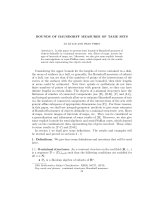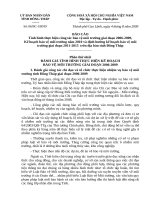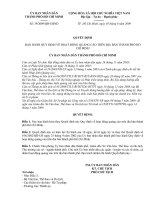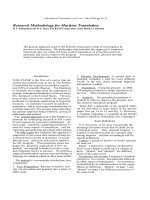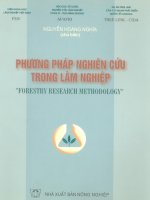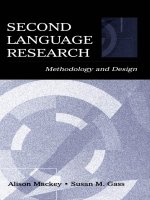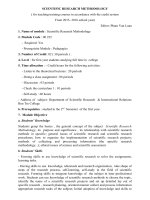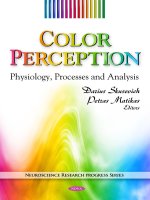Research methodology 2009
Bạn đang xem bản rút gọn của tài liệu. Xem và tải ngay bản đầy đủ của tài liệu tại đây (145.31 KB, 35 trang )
Research
Research
Starting: One Big
Starting: One Big
Mess . . .
Mess . . .
O.k., you're already in a mess and are looking out of the
O.k., you're already in a mess and are looking out of the
window thinking about having a nervous breakdown.
window thinking about having a nervous breakdown.
You're sitting there surrounded by books and copies of
You're sitting there surrounded by books and copies of
articles that seem to be multiplying on their own and you
articles that seem to be multiplying on their own and you
don't know how to get started with the paper or even how
don't know how to get started with the paper or even how
to make sense out of all of this information. And the kids
to make sense out of all of this information. And the kids
are knocking at your door and the paper is due in a week.
are knocking at your door and the paper is due in a week.
So how do you get out of this mess?
So how do you get out of this mess?
One Big Mess . . .
One Big Mess . . .
Calm down. That's the first thing. Then start reviewing your
Calm down. That's the first thing. Then start reviewing your
sources. A good way to review is to re-read with your pen in your
sources. A good way to review is to re-read with your pen in your
hand so you can make margin notes and jot down the main ideas
hand so you can make margin notes and jot down the main ideas
and main points of argument. Review those margin notes. Can you
and main points of argument. Review those margin notes. Can you
find a common thread of idea or argument in them (other than their
find a common thread of idea or argument in them (other than their
common topic)? Do many of the authors advocate the same thing?
common topic)? Do many of the authors advocate the same thing?
Do you agree? As you can see, the first thing to do (the thing you
Do you agree? As you can see, the first thing to do (the thing you
should have done before starting your research) is to approach the
should have done before starting your research) is to approach the
research with a focused question or a tentative argument in mind.
research with a focused question or a tentative argument in mind.
Sift through the sources to eliminate those that don't fit your focus
Sift through the sources to eliminate those that don't fit your focus
and identify relevant portions of those that do. Then follow the
and identify relevant portions of those that do. Then follow the
research writing steps that we've outlined here, in this course and
research writing steps that we've outlined here, in this course and
calm down the next time definitely will be easier, once you know
calm down the next time definitely will be easier, once you know
the process and special considerations for writing a research paper
the process and special considerations for writing a research paper
Developing a Research Question
Developing a Research Question
It's absolutely essential to develop a research question
It's absolutely essential to develop a research question
that you're interested in or care about in order to focus
that you're interested in or care about in order to focus
your research and your paper (unless, of course, your
your research and your paper (unless, of course, your
instructor gives you a very specific assignment). For
instructor gives you a very specific assignment). For
example, researching a broad topic such as "business
example, researching a broad topic such as "business
management" is difficult since there may be hundreds of
management" is difficult since there may be hundreds of
sources on all aspects of business management. On the
sources on all aspects of business management. On the
other hand, a focused question such as "What are the
other hand, a focused question such as "What are the
pros and cons of Japanese management style?" is easier
pros and cons of Japanese management style?" is easier
to research and can be covered more fully and in more
to research and can be covered more fully and in more
depth.
depth.
Developing a Research Question
Developing a Research Question
How do you develop a usable research question? Choose an
How do you develop a usable research question? Choose an
appropriate
appropriate
topic or issue
topic or issue
for your research, one that actually can
for your research, one that actually can
be researched. Then list all of the questions that you'd like
be researched. Then list all of the questions that you'd like
answered yourself. Choose the best question,
answered yourself. Choose the best question,
one that is neither too broad nor too narrow
one that is neither too broad nor too narrow
.
.
If you know a lot about the topic, you can develop a research
If you know a lot about the topic, you can develop a research
question based on your own knowledge. If you feel you don't know
question based on your own knowledge. If you feel you don't know
much about the topic, think again. Once you determine what you do
much about the topic, think again. Once you determine what you do
know, then you're ready to do some general reading in a textbook
know, then you're ready to do some general reading in a textbook
or encyclopedia in order to develop a usable research question.
or encyclopedia in order to develop a usable research question.
It's a good idea to evaluate your research question before
It's a good idea to evaluate your research question before
completing the research exercise and to
completing the research exercise and to
Ask the writing tutor for
Ask the writing tutor for
feedback on your research question
feedback on your research question
. And you also should check
. And you also should check
your research question with your course tutor.
your research question with your course tutor.
Topic/Issue
Topic/Issue
A topic is what the essay or research paper is about. It
A topic is what the essay or research paper is about. It
provides a focus for the writing. Of course, the major
provides a focus for the writing. Of course, the major
topic can be broken down into its components or smaller
topic can be broken down into its components or smaller
pieces (e.g., the major topic of nuclear waste disposal
pieces (e.g., the major topic of nuclear waste disposal
may be broken down into medical, economic, and
may be broken down into medical, economic, and
environmental concerns). But the important thing to
environmental concerns). But the important thing to
remember is that you should stick with just one major
remember is that you should stick with just one major
topic per essay or research paper in order to have a
topic per essay or research paper in order to have a
coherent piece of writing.
coherent piece of writing.
An issue is a concept upon which you can take a stand.
An issue is a concept upon which you can take a stand.
While "nuclear waste" is a topic, "safe and economic
While "nuclear waste" is a topic, "safe and economic
disposal of nuclear waste" is an issue, or a "point of
disposal of nuclear waste" is an issue, or a "point of
discussion, debate, or dispute" (American Heritage
discussion, debate, or dispute" (American Heritage
Dictionary).
Dictionary).
Choose a Question that is Neither Too
Choose a Question that is Neither Too
Broad or Too Narrow
Broad or Too Narrow
For example:
For example:
if you choose juvenile delinquency is a topic that can be
if you choose juvenile delinquency is a topic that can be
researched, you might ask the following questions:
researched, you might ask the following questions:
a.
a.
What is the 1994 rate of juvenile delinquency in the
What is the 1994 rate of juvenile delinquency in the
U.S.?
U.S.?
b.
b.
What can we do to reduce juvenile delinquency in the
What can we do to reduce juvenile delinquency in the
U.S.
U.S.
c.
c.
Does education play a role in reducing juvenile
Does education play a role in reducing juvenile
delinquents' return to crime?
delinquents' return to crime?
Once you complete your list, review your questions in
Once you complete your list, review your questions in
order to choose a usable one that is neither too broad
order to choose a usable one that is neither too broad
nor too narrow. In this case, the best research question
nor too narrow. In this case, the best research question
is:
is:
Choose a Question
Choose a Question
"c."
"c."
Question "a" is too narrow, since it can be answered with a simple statistic.
Question "a" is too narrow, since it can be answered with a simple statistic.
Question "b" is too broad; it implies that the researcher will cover many tactics for
Question "b" is too broad; it implies that the researcher will cover many tactics for
reducing juvenile delinquency that could be used throughout the country.
reducing juvenile delinquency that could be used throughout the country.
Question "c," on the other hand, is focused enough to research in some depth
Question "c," on the other hand, is focused enough to research in some depth
Choose a Question (example 2)
Choose a Question (example 2)
Select what you think is the best research
Select what you think is the best research
question (neither too broad nor too narrow):
question (neither too broad nor too narrow):
- Question A:
- Question A:
What marketing strategies does
What marketing strategies does
the Coca-Cola company currently apply?
the Coca-Cola company currently apply?
- Question B:
- Question B:
What is the Coca-Cola company's
What is the Coca-Cola company's
future marketing plan?
future marketing plan?
- Question C:
- Question C:
What marketing strategies has
What marketing strategies has
the Coca-Cola company used in the past?
the Coca-Cola company used in the past?
Choose a Question: Explanation
Choose a Question: Explanation
Question "c" may be too broad as well, since "the past" covers a lot
Question "c" may be too broad as well, since "the past" covers a lot
of time, especially since the Coca-Cola company was incorporated in
of time, especially since the Coca-Cola company was incorporated in
1919.
1919.
Question "b" is very broad as well as being unresearchable it's
Question "b" is very broad as well as being unresearchable it's
unlikely that Coca-Cola personnel will reveal their marketing plan
unlikely that Coca-Cola personnel will reveal their marketing plan
Question "a" is the best research question. Your research to answer
Question "a" is the best research question. Your research to answer
this question may include observation of print, television, and radio
this question may include observation of print, television, and radio
advertisements as well as research into various current marketing
advertisements as well as research into various current marketing
theories and strategies. Both types of research are "do-able," and
theories and strategies. Both types of research are "do-able," and
the question is focused enough to yield a fully-developed research
the question is focused enough to yield a fully-developed research
paper
paper
Evaluate Your Own Research Question
Evaluate Your Own Research Question
Ask the following 8 questions to evaluate the quality of your research question and
Ask the following 8 questions to evaluate the quality of your research question and
the ease with which you should be able to answer it:
the ease with which you should be able to answer it:
1. Does the question deal with a topic or issue that interests me enough to spark my
1. Does the question deal with a topic or issue that interests me enough to spark my
own thoughts and opinions?
own thoughts and opinions?
2. Is the question easily and fully researchable?
2. Is the question easily and fully researchable?
Evaluate Your Own Research Question
Evaluate Your Own Research Question
3. What type of information do I need to answer the
3. What type of information do I need to answer the
research question?
research question?
E.g., The research question, "What impact has
E.g., The research question, "What impact has
deregulation had on commercial airline safety?," will
deregulation had on commercial airline safety?," will
obviously require certain types of information:
obviously require certain types of information:
- statistics on airline crashes before and after
- statistics on airline crashes before and after
–
statistics on other safety problems before and after
statistics on other safety problems before and after
–
information about maintenance practices before and
information about maintenance practices before and
after
after
–
information about government safety requirements
information about government safety requirements
before and after
before and after
Evaluate Your Own Research Question
Evaluate Your Own Research Question
4. Is the scope of this information reasonable (e.g., can I
4. Is the scope of this information reasonable (e.g., can I
really research 30 online writing programs developed
really research 30 online writing programs developed
over a span of 10 years?)
over a span of 10 years?)
5. Given the type and scope of the information that I need,
5. Given the type and scope of the information that I need,
is my question too broad, too narrow, or okay?
is my question too broad, too narrow, or okay?
6. What sources will have the type of information that I
6. What sources will have the type of information that I
need to answer the research question (journals, books,
need to answer the research question (journals, books,
Internet resources, government documents, people)?
Internet resources, government documents, people)?
7. Can I access these sources?
7. Can I access these sources?
8. Given my answers to the above questions, do I have a
8. Given my answers to the above questions, do I have a
good quality research question that I actually will be
good quality research question that I actually will be
able to answer by doing research?
able to answer by doing research?
Thesis statement
Thesis statement
Whenever you are writing to explain something to your
Whenever you are writing to explain something to your
reader or to persuade your reader to agree with your
reader or to persuade your reader to agree with your
opinion, there should be one complete sentence that
opinion, there should be one complete sentence that
expresses the main idea of your paper. That sentence is
expresses the main idea of your paper. That sentence is
often called the thesis, or thesis statement. (Some other
often called the thesis, or thesis statement. (Some other
names it goes by are "the main idea" and "the
names it goes by are "the main idea" and "the
controlling idea.")
controlling idea.")
Based on everything you've read, and thought, and
Based on everything you've read, and thought, and
brainstormed, the thesis is not just your topic, but what
brainstormed, the thesis is not just your topic, but what
you're saying about your topic. Another way to look at it
you're saying about your topic. Another way to look at it
is, once you've come up with the central question, or
is, once you've come up with the central question, or
organizing question, of your essay, the thesis is an
organizing question, of your essay, the thesis is an
answer to that question
answer to that question
Exercise: Thesis Statement
Exercise: Thesis Statement
Suppose you've been answering a research question about adult illiteracy in
Suppose you've been answering a research question about adult illiteracy in
the Vietnam, and have a fourteen-page draft about how widespread the
the Vietnam, and have a fourteen-page draft about how widespread the
problem is, six or seven pages analyzing the causes of the problem, and six
problem is, six or seven pages analyzing the causes of the problem, and six
or seven pages evaluating possible solutions and proposing one you feel
or seven pages evaluating possible solutions and proposing one you feel
would be effective.
would be effective.
Which of the following sentences might make the best thesis statement for
Which of the following sentences might make the best thesis statement for
your paper?
your paper?
- Adult illiteracy poses the greatest threat to VN today.
- Adult illiteracy poses the greatest threat to VN today.
- Adult illiteracy has many causes, but it can be eliminated.
- Adult illiteracy has many causes, but it can be eliminated.
- How can the problem of adult illiteracy in VN be effectively addressed?
- How can the problem of adult illiteracy in VN be effectively addressed?
- Subsuming a myriad of causal factors, adult illiteracy manifests itself
- Subsuming a myriad of causal factors, adult illiteracy manifests itself
throughout contemporary VN society.
throughout contemporary VN society.
- We can eliminate adult illiteracy in VN now!
- We can eliminate adult illiteracy in VN now!
"Adult illiteracy poses the greatest threat to
"Adult illiteracy poses the greatest threat to
VN today."
VN today."
This certainly is a direct, active opinion statement, and refers to the
This certainly is a direct, active opinion statement, and refers to the
topic of adult illiteracy in VN. However, there are a couple of
topic of adult illiteracy in VN. However, there are a couple of
problems with it as the thesis, or main idea, for the draft you've
problems with it as the thesis, or main idea, for the draft you've
written.
written.
First, calling adult illiteracy the "greatest threat" to VN today is a
First, calling adult illiteracy the "greatest threat" to VN today is a
very large claim: what about all the other terrible problems
very large claim: what about all the other terrible problems
confronting us? There's no need to make such a large claim, which
confronting us? There's no need to make such a large claim, which
may only distract your reader with thoughts of other problems.
may only distract your reader with thoughts of other problems.
Second, the focus of your draft isn't the threat that illiteracy poses
Second, the focus of your draft isn't the threat that illiteracy poses
you've got only about one page out of fourteen about how
you've got only about one page out of fourteen about how
widespread the problem is (maybe for your introduction), and
widespread the problem is (maybe for your introduction), and
nothing about its consequences (economic, social, political,
nothing about its consequences (economic, social, political,
whatever). Clearly, that's not what your paper is "about." Instead,
whatever). Clearly, that's not what your paper is "about." Instead,
what your draft does discuss at length are causes and possible
what your draft does discuss at length are causes and possible
solutions, but your thesis doesn't let your reader know that
solutions, but your thesis doesn't let your reader know that
Adult illiteracy has many causes,
Adult illiteracy has many causes,
but it can be eliminated
but it can be eliminated
Let's see this sentence identifies the topic of the paper as adult
Let's see this sentence identifies the topic of the paper as adult
illiteracy, and indicates that there are many causes, which the
illiteracy, and indicates that there are many causes, which the
reader will naturally expect you to explain (and you do, for about
reader will naturally expect you to explain (and you do, for about
half of your draft). Then comes the "but," a logical link to the
half of your draft). Then comes the "but," a logical link to the
opposite of "causes," which would be "solutions" or "cures" or
opposite of "causes," which would be "solutions" or "cures" or
something of the sort.
something of the sort.
Instead, the sentence continues "but it can be eliminated." Well,
Instead, the sentence continues "but it can be eliminated." Well,
this seems to do the same job as "solutions" or "cures" in fact,
this seems to do the same job as "solutions" or "cures" in fact,
asserting that adult illiteracy can actually be eliminated is a strong
asserting that adult illiteracy can actually be eliminated is a strong
positive statement indeed. What's more, just as your draft
positive statement indeed. What's more, just as your draft
addresses the causes of illiteracy, it goes on to discuss its
addresses the causes of illiteracy, it goes on to discuss its
elimination, but evaluating solutions and proposing one you feel
elimination, but evaluating solutions and proposing one you feel
would be effective.
would be effective.
All in all, then, this sentence prepares your reader for exactly the
All in all, then, this sentence prepares your reader for exactly the
paper you are delivering. It works as a thesis sentence for your
paper you are delivering. It works as a thesis sentence for your
paper.
paper.
How can the problem of adult illiteracy
How can the problem of adult illiteracy
in VN be effectively addressed?
in VN be effectively addressed?
The topic is certainly clear here: adult illiteracy in VN. Also, this
The topic is certainly clear here: adult illiteracy in VN. Also, this
sentence goes on to focus on how this problem may "be effectively
sentence goes on to focus on how this problem may "be effectively
addressed," which is one good way to prepare the reader for your
addressed," which is one good way to prepare the reader for your
evaluation of possible solutions and proposal of one you feel would
evaluation of possible solutions and proposal of one you feel would
be effective.
be effective.
However, while this is a major part of your draft six or seven
However, while this is a major part of your draft six or seven
pages and perhaps even the most important part, your draft first
pages and perhaps even the most important part, your draft first
devotes almost equal space to analyzing the causes of the problem.
devotes almost equal space to analyzing the causes of the problem.
Shouldn't you let your reader know that? Otherwise, instead of fully
Shouldn't you let your reader know that? Otherwise, instead of fully
appreciating the fact that you deal with causes, then solutions, your
appreciating the fact that you deal with causes, then solutions, your
reader might wonder why you don't immediately get to addressing
reader might wonder why you don't immediately get to addressing
the problem, becoming impatient instead of valuing your efforts and
the problem, becoming impatient instead of valuing your efforts and
ideas.
ideas.
There's another problem with using this sentence as your thesis
There's another problem with using this sentence as your thesis
statement.
statement.
Its not a statement!!!!
Its not a statement!!!!
It's in question form, and
It's in question form, and
that's not what your reader ordinarily expects of a thesis.
that's not what your reader ordinarily expects of a thesis.
We can eliminate adult
We can eliminate adult
illiteracy in VN now
illiteracy in VN now
!
!
Nobody can deny it this is definitely a strong, direct statement of an opinion! That would
Nobody can deny it this is definitely a strong, direct statement of an opinion! That would
be true even without the exclamation point at the end. The topic of your paper is also clear:
be true even without the exclamation point at the end. The topic of your paper is also clear:
adult illiteracy in VN.
adult illiteracy in VN.
However, let's take a look at what this sentence says about the topic. It states that "We"
However, let's take a look at what this sentence says about the topic. It states that "We"
"can eliminate adult illiteracy in VN now." Eliminating illiteracy is a major part of your draft,
"can eliminate adult illiteracy in VN now." Eliminating illiteracy is a major part of your draft,
the six or seven pages evaluating possible solutions and proposing one you feel would be
the six or seven pages evaluating possible solutions and proposing one you feel would be
effective. Yet, there is another major part of your draft leading up to this: six pages
effective. Yet, there is another major part of your draft leading up to this: six pages
analyzing the causes of adult illiteracy. This sentence doesn't mention causes; it doesn't
analyzing the causes of adult illiteracy. This sentence doesn't mention causes; it doesn't
prepare your reader for the first half of your paper. Now, you might argue that a reader
prepare your reader for the first half of your paper. Now, you might argue that a reader
would expect a paper about how to eliminate adult illiteracy would naturally address the
would expect a paper about how to eliminate adult illiteracy would naturally address the
causes of illiteracy first. Still, ask yourself if it's wise to assume that; it may be safer to
causes of illiteracy first. Still, ask yourself if it's wise to assume that; it may be safer to
include the causes of illiteracy in your thesis statement, so that your reader will know
include the causes of illiteracy in your thesis statement, so that your reader will know
exactly how you intend to approach the topic. That way, your reader will be ready to
exactly how you intend to approach the topic. That way, your reader will be ready to
appreciate your analysis of the causes, instead of becoming confused, distracted, or
appreciate your analysis of the causes, instead of becoming confused, distracted, or
impatient: "When do we get to the good part how to eliminate it????!!!!"
impatient: "When do we get to the good part how to eliminate it????!!!!"
One last point about that word "now" in "We can eliminate adult illiteracy in VN now!" It's
One last point about that word "now" in "We can eliminate adult illiteracy in VN now!" It's
true that your draft does propose a solution you feel would be effective but are you
true that your draft does propose a solution you feel would be effective but are you
promising a miracle? Check your draft again. Do you argue that adult illiteracy can be
promising a miracle? Check your draft again. Do you argue that adult illiteracy can be
eliminated now as in immediately? Is it even necessary to deal with how soon illiteracy can
eliminated now as in immediately? Is it even necessary to deal with how soon illiteracy can
be eliminated, or just that it can be done? For such a tiny word, "now" makes a very big
be eliminated, or just that it can be done? For such a tiny word, "now" makes a very big
claim; it could be making your thesis statement much larger than what you want to say in
claim; it could be making your thesis statement much larger than what you want to say in
your paper.
your paper.
Subsuming a myriad of causal factors, adult
Subsuming a myriad of causal factors, adult
illiteracy manifests itself throughout
illiteracy manifests itself throughout
contemporary VN society
contemporary VN society
This sentence does speak about the topic of adult illiteracy in VN. There are
This sentence does speak about the topic of adult illiteracy in VN. There are
problems, however, with what it says about the topic and how it says it
problems, however, with what it says about the topic and how it says it
How to Take Notes
How to Take Notes
First of all, make sure that you record all necessary and appropriate information:
First of all, make sure that you record all necessary and appropriate information:
author, title, publisher, place of publication, volume, span of pages, date. It's
author, title, publisher, place of publication, volume, span of pages, date. It's
probably easiest to keep this basic information about each sources on individual 3x5
probably easiest to keep this basic information about each sources on individual 3x5
or 4x6 notecards. This way when you come to creating the "Works Cited" or
or 4x6 notecards. This way when you come to creating the "Works Cited" or
"References" at the end of your paper, you can easily alphabetize your cards to
"References" at the end of your paper, you can easily alphabetize your cards to
create the list. Also keep a running list of page numbers as you take notes, so you
create the list. Also keep a running list of page numbers as you take notes, so you
can identify the exact location of each piece of noted information. Remember, you
can identify the exact location of each piece of noted information. Remember, you
will have to refer to these sources accurately, sometimes using page numbers within
will have to refer to these sources accurately, sometimes using page numbers within
your paper and, depending on the type of source, using page numbers as part of
your paper and, depending on the type of source, using page numbers as part of
your list of sources at the end of the paper.
your list of sources at the end of the paper.
Many people recommend taking all your notes on notecards. The advantage of
Many people recommend taking all your notes on notecards. The advantage of
notecards is that if you write very specific notes, or only one idea on one side of the
notecards is that if you write very specific notes, or only one idea on one side of the
card, you can then spread them out on a table and rearrange them as you are
card, you can then spread them out on a table and rearrange them as you are
structuring your paper. They're also small and neat and can help you stay organized.
structuring your paper. They're also small and neat and can help you stay organized.
Some people find notecards too small and frustrating to work with when taking
Some people find notecards too small and frustrating to work with when taking
notes, and use a notebook instead. They leave plenty of space between notes and
notes, and use a notebook instead. They leave plenty of space between notes and
only write on one side of the page. Later, they either cut up their notes and arrange
only write on one side of the page. Later, they either cut up their notes and arrange
them as they would the cards, or they color code their notes to help them arrange
them as they would the cards, or they color code their notes to help them arrange
information for sections or paragraphs of their paper.
information for sections or paragraphs of their paper.
What to Put into Notes
What to Put into Notes
When you take notes, your job is
When you take notes, your job is
not
not
to write everything down, nor is it a
to write everything down, nor is it a
good idea to give into the temptation of photocopying pages or articles.
good idea to give into the temptation of photocopying pages or articles.
Notetaking is the process of extracting only the information that answers
Notetaking is the process of extracting only the information that answers
your research question or supports your working thesis directly. Notes can
your research question or supports your working thesis directly. Notes can
be in one of three forms:
be in one of three forms:
summary, paraphrase
summary, paraphrase
, or
, or
direct quotation
direct quotation
.
.
(It's a good idea to come up with a system you might simply label each
(It's a good idea to come up with a system you might simply label each
card or note "s" "p" or "q" as a way of keeping track of the kind of notes
card or note "s" "p" or "q" as a way of keeping track of the kind of notes
you took from a source.) Also, a direct quotation reproduces the source's
you took from a source.) Also, a direct quotation reproduces the source's
words and punctuation exactly, so you add quotation marks around the
words and punctuation exactly, so you add quotation marks around the
sentence(s) to show this. Remember it is essential to record the exact page
sentence(s) to show this. Remember it is essential to record the exact page
numbers of the specific notes, since you will need them later for your
numbers of the specific notes, since you will need them later for your
documentation.
documentation.
Work carefully to make sure you have recorded the source of your notes,
Work carefully to make sure you have recorded the source of your notes,
and the basic information you will need when citing your source, to save
and the basic information you will need when citing your source, to save
yourself a great deal of time and frustration otherwise you will have to
yourself a great deal of time and frustration otherwise you will have to
make extra trips to the library when writing your final draft.
make extra trips to the library when writing your final draft.
How to Use Idea Cards
How to Use Idea Cards
While doing your research you will be making connections and synthesizing what you
While doing your research you will be making connections and synthesizing what you
are learning. Some people find it useful to make "idea cards" or notes in which they
are learning. Some people find it useful to make "idea cards" or notes in which they
write out the ideas and perceptions they are developing about their topic.
write out the ideas and perceptions they are developing about their topic.
How to Work with Notes
How to Work with Notes
1. After you take notes, re-read them.
1. After you take notes, re-read them.
2. Then re-organize them by putting similar information together. Working
2. Then re-organize them by putting similar information together. Working
with your notes involves re-grouping them by topic instead of by source. Re-
with your notes involves re-grouping them by topic instead of by source. Re-
group your notes by re-shuffling your index cards or by color-coding or
group your notes by re-shuffling your index cards or by color-coding or
using symbols to code notes in a notebook.
using symbols to code notes in a notebook.
3. Review the topics of your newly-grouped notes. If the topics do not
3. Review the topics of your newly-grouped notes. If the topics do not
answer your research question or support your working thesis directly, you
answer your research question or support your working thesis directly, you
may need to do additional research or re-think your original research.
may need to do additional research or re-think your original research.
4. During this process you may find that you have taken notes that do not
4. During this process you may find that you have taken notes that do not
answer your research question or support your working thesis directly. Don't
answer your research question or support your working thesis directly. Don't
be afraid to throw them away.
be afraid to throw them away.
It may have struck you that you just read a lot of "re" words: re-read, re-
It may have struck you that you just read a lot of "re" words: re-read, re-
organize, re-group, re-shuffle, re-think. That's right; working with your
organize, re-group, re-shuffle, re-think. That's right; working with your
notes essentially means going back and reviewing how this "new"
notes essentially means going back and reviewing how this "new"
information fits with your own thoughts about the topic or issue of the
information fits with your own thoughts about the topic or issue of the
research.
research.
Grouping your notes should enable you to outline the major sections and
Grouping your notes should enable you to outline the major sections and
then the paragraph of your research paper.
then the paragraph of your research paper.
Using Quotations in a Paper
Using Quotations in a Paper
A research paper blends your own ideas and information from
A research paper blends your own ideas and information from
expert sources. It is NOT a series of direct quotations strung
expert sources. It is NOT a series of direct quotations strung
together. A common complaint of faculty is that students use too
together. A common complaint of faculty is that students use too
many direct quotes in their papers instead of formulating their own
many direct quotes in their papers instead of formulating their own
ideas about the paper topic and using quotes rather sparingly as
ideas about the paper topic and using quotes rather sparingly as
one way to substantiate their point of view on the topic.
one way to substantiate their point of view on the topic.
Use
Use
summaries and paraphrases
summaries and paraphrases
most often to support your
most often to support your
own ideas. Use direct quotations only when the information is so
own ideas. Use direct quotations only when the information is so
well presented (or in the interest of clarity, emphasis, or accuracy),
well presented (or in the interest of clarity, emphasis, or accuracy),
that you think the exact language of the source should be used.
that you think the exact language of the source should be used.
Remember that when you do choose to use direct quotations, you
Remember that when you do choose to use direct quotations, you
need to retain the exact wording, spelling, and punctuation of the
need to retain the exact wording, spelling, and punctuation of the
original source. And remember, too, that just like when using a
original source. And remember, too, that just like when using a
direct quotation, you must cite your source when summarizing or
direct quotation, you must cite your source when summarizing or
paraphrasing.
paraphrasing.
Long Quotations
Long Quotations
If you decide to use a quotation that is longer than four lines, it is not put in
If you decide to use a quotation that is longer than four lines, it is not put in
quotation marks but rather indented from the left.
quotation marks but rather indented from the left.
Once again remember that you will need to document or show the source of the
Once again remember that you will need to document or show the source of the
quotations you use, so make sure that you have recorded all necessary information
quotations you use, so make sure that you have recorded all necessary information
about the source.
about the source.
